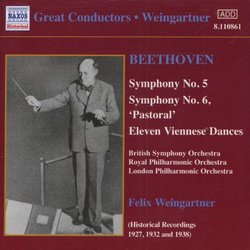| All Artists: Weingartner, Beethoven, Rpo, Lpo Title: Great Conductors: Felix Weingartner Members Wishing: 0 Total Copies: 0 Label: Naxos Original Release Date: 1/1/2027 Re-Release Date: 3/18/2003 Genre: Classical Styles: Chamber Music, Historical Periods, Classical (c.1770-1830), Modern, 20th, & 21st Century, Symphonies Number of Discs: 1 SwapaCD Credits: 1 UPC: 636943186121 |
Search - Weingartner, Beethoven, Rpo :: Great Conductors: Felix Weingartner
CD Details |
CD ReviewsWeingartner RULES! Ralph J. Steinberg | New York, NY United States | 08/24/2003 (5 out of 5 stars) "As far as I am concerned, there are three supreme recordings of the Fifth Symphony: Furtwaengler's 1937 BPO reading, Kleiber's Concertgebouw performance, and Weingartner's 1932 British Symphony rendition, the one under current consideration. This performance is a superb synthesis of electricity and gravity, the First Movement being much darker and ominous than usual. The Finale is one of the few that maintains the tension generated by the earlier movements, something that only Furtwaengler also was able to achieve. The "Pastorale" is only slightly less impressive, mainly because the Royal Philharmonic at that time was not a permanent organization and therefore less responsive than other orchestras to Weingartner's demands. The Eleven Viennese Dances are lovingly and lightly played, and make a perfect companion to the two Symphonies. I'm looking forward to further installments in this Weingartner series on Naxos. Dare I hope for the rest of his Beethoven, the Brahms, Mozart, Wagner, etc?" One hit, one near-miss, and one charmer J Scott Morrison | Middlebury VT, USA | 04/07/2003 (4 out of 5 stars) "Naxos continues to release discs in its series of Beethoven recordings by Felix Weingartner (1863-1942) who was the first conductor to record all the Beethoven symphonies. I exulted about the release of the Third and Fourth Symphonies earlier this year. I'm afraid I'm not as enthusiastic about this release, because the recording of the Sixth ('Pastoral') is not up to the others I've heard.Weingartner, for some reason, recorded the Pastoral Symphony only once (as opposed to four times, say, for the Fifth). And this recording was fairly early in the 'electric era,' 1927, and the current record's producer, the redoubtable Mark Obert-Thorn, indicates that it suffered from 'severe pitch instability on every [78 rpm] side.' Efforts were made, of course, to compensate for this, but I'm afraid it still is somewhat in evidence. More important, however, is the lackluster playing of the Royal Philharmonic. This is not to say that Weingartner doesn't do his usual masterful shaping and moulding of the music. But his players seem to be having, shall we say, an off day. In addition, for my taste the 'Scene by the brook' seems hurried. The 'Thunderstorm,' is successfully conveyed but hindered by clipped fortissimi.The Fifth, on the other hand, is a veritable blockbuster. This is the third of four complete recordings of the symphony made by Weingartner and dates from 1932. Strangely, it was never released in the UK, although it was in the US until replaced by Weingartner's fourth recording of the work. The orchestra for this recording was the British Symphony Orchestra which was founded in order to give returned World War I veterans an orchestra to play in. Do not think for a second that this was some ad hoc group that was a sort of make-work scheme for some sad returning musicians. It was a crack group that lasted for a number of years and made a number of fine recordings. And this is one of them. The Fifth crackles with excitement and brio as well as precision and musicianly phrasing. Weingartner was perhaps known best for his ability to bring out elegantly nuanced dynamics in the service of a work's architecture. As mentioned in my previous review of the 'Eroica,' one delight is his ability to command sforzandi that are gauged to the surrounding dynamic rather than simply hitting you in the face. The disc concludes with Eleven Viennese Dances, WoO. 17, charming trifles that are charmlingly played.Of course, one must make allowances for recordings made so early in the electric era, but Obert-Thorn has done his usual fine job of giving us the best sound possible and he can't be blamed for the pitch and distortion problems in the 'Pastoral.'" Blessed is Beethoven - Blessed is Weingartner! Pupil | Malkuth | 11/19/2003 (5 out of 5 stars) "This is by far the most organic and selfless recording of the fifth symphony I have ever heard.
It dances where others trudge, it soars effortlessly where others try very hard to. Its spiritual qualities are never demeaned by the mind's silly efforts to conceptualize the divine. It is perfectly present, perfectly natural. This music might make you cry, because I definitely think it is the closest to Beethoven's conception, and Beethoven is the greatest composer who ever lived and blessed mankind with his works." |

